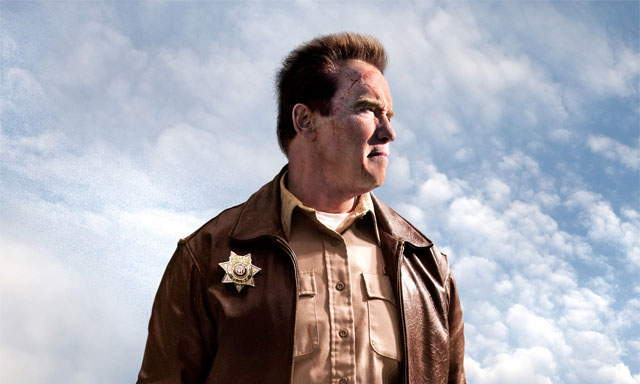
Film: The Last Stand
Country: USA
Year of Release: 2012
Director: Kim Jee-woon
Screenwriters: Andrew Knauer, Jeffrey Nachmanoff, George Nolfi
Starring: Arnold Schwarzenegger, Forest Whitaker, Jaimie Alexander, Harry Dean Stanton, Rodrigo Santoro, Johnny Knoxville
♥♥♥
Considering his extraordinarily narrow range, Arnold Schwarznegger has a remarkable on-screen presence, a presence that is barely suppressed by the increasingly wizened and wiry texture of his aging face and still very substantial body. Schwarzenegger, who can barely act, is nonetheless still capable of carrying the right kind of film on his not-exactly-neglible shoulders with little more than a strident posture, his strangely mesmerising fascist beauty and a clipped Austrian accent that is seldom given more than two sentences at a time.
While The Last Stand is Schwarzenegger’s smallest film since he achieved mainstream stardom, and the first since his eight-year career detour as Governor of California, it is at the same time the most emphatically Scharzenegger film he has made, his character essentially a rolling concatenation of all his previous roles, blended in with his public personality and unlikely career arc. The film is also, it should be said, a very safe and self-effacing comeback flick.
The Last Stand tells the story of a small town sheriff named Ray Owens (Schwarzenegger) who has retired to remote Sommerton from Los Angeles, after being the only one of 80 policeman who survived a terrible massacre. Little happens in Sommerton, and one senses that little ever has. But that all changes when Owens gets word of the fact that notorious crime boss Gabriel Cortez (Eduardo Noriega) is about to drive through town in a souped-up Corvette ZR1 en route to Mexico. Cortez has recently been liberated from the custody of the FBI and receives carefully co-ordinated – and ultraviolent – assistance from his criminal network as he heads south down America’s freeways, dispensing with police road blocks as easily as a child’s breath with dandelion seeds. Owens and his small-town crew are, however, another kettle of fish entirely. Because Owens is, after all, really Arnold Schwarzenegger. He is the Terminator.
Beyond the Arnie metanarrative, the film’s key conceit is to take a bouquet of familiar A-list stars and stuff them into a plotline that barely qualifies as C-Grade and would surely in an earlier time have gone straight to video. As well as Arnie, we get Forrest Whittaker, Harry Dean Stanton, Rodrigo Santoro and, er, Johnny Knoxville (whose presence in the film is so thoroughly gratuitous and distracting that it can only be the product of a marketing team who were intent on garnering younger viewers, a suspicion confirmed by the fact that Knoxville is second-billed on the film’s poster). If Scharzennger can’t act, neither can Knoxville. But Knoxville can’t not perform, which is a disaster for the film, which would in an artistically authentic world have edited him out. (The moral of the story here is if you can’t act, don’t. Just talk – everything will be fine).
And, bar the presence of Knoxville, it all pretty much works, courtesy of carefully styled direction from popular South Korean director Kim Jee-woon, who makes his English-language debut with The Last Stand. By lowering the bar and maintaining the linearity of its plot, the film also strips away all the dross of so many of today’s hypersaturated twist-and-turn action flicks. If there’s not a whole lot that remains, I think that’s kind of the point. But what there is engages fluidly and with a fair degree of excitement – like an old ’80s episode of Knight Rider or Airwolf. And if all of this sounds slightly sarcastic, it’s not. The Last Stand doesn’t even begin to touch the edge of brilliance – it’s not that kind of film – but in its solid embrace of pared down, old-school action, it celebrates itself as exactly what it is, its gentle layers of irony and pop-commentary never getting in the way of it’s gun-toting, bare-bones action.
The occasional use of stirring strings aside – they are both ironic and slightly sincere, thus covering both bases – The Last Stand is not the kind of film to indulge in sending messages to its audience. Yet in the midst of its well choreographed and vaguely restrained chaos, the film does come through with a single strand of important information. And it is this: if the sheriff asks to use your car as a barricade against a crime lord who is about to pass through your town, just say no. Why would you say yes?
© PETER MACHEN 2017